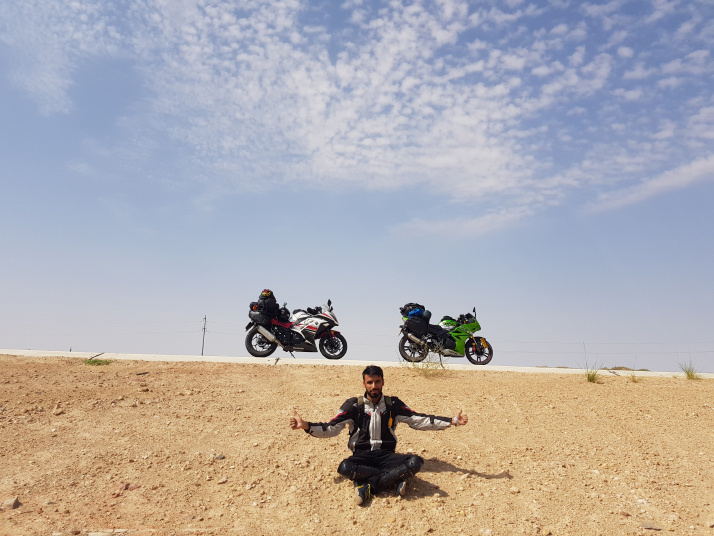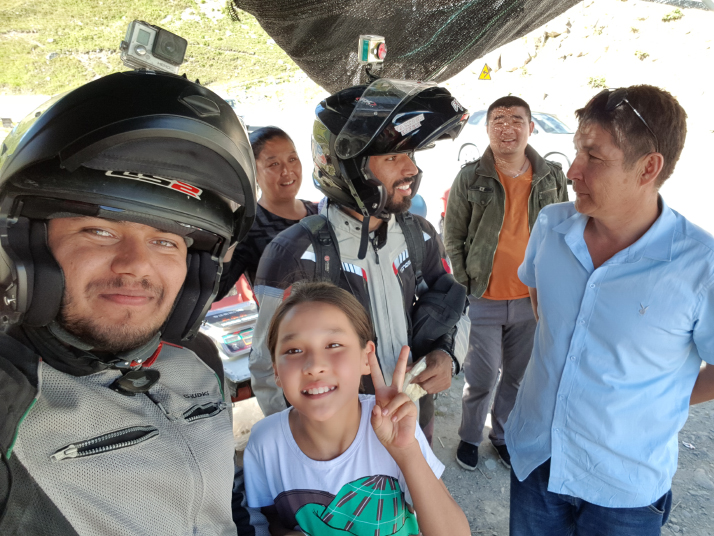| Lifestyle |
| An international student's motorcycle journey through northwest China | |
|
|
 (left) Harood Nishat (left, second row), a Pakistani student at Tsinghua University, talks to a local people in Xinjiang Uygur Autonomous Region in 2018 Harood Nishat travels from Beijing to Islamabad by motorbike in the summer of 2018 (COURTESY PHOTO)
Harood Nishat, a 28-year-old Pakistani student at Tsinghua University, traveled from Beijing to Islamabad by motorbike in the summer of 2018 with one of his friends. It took 28 days to journey more than 6,000 km, passing through Inner Mongolia Autonomous Region, Gansu Province and Xinjiang Uygur Autonomous Region in China, before reaching Islamabad in northeast Pakistan. The longest leg of their travel—nine days—took place in Xinjiang. Most of the time, they were camping. Sometimes, they lodged in mosques or in the homes of locals. They talked with imams, ordinary Muslims and people from different ethnic groups in urban and rural Xinjiang. What did they see and hear in the region? The following is what Nishat shared with Beijing Review reporter Li Nan regarding his trans-border journey: I love traveling by motorbike. I had just bought one in Pakistan when I got the news that I was going to China to study. I was not ready to say goodbye to my new motorbike, so I asked my parents, "Why don't I just ride my motorbike to China?" It was my first time going to a new country, and my family thought the ride would be very dangerous so they didn't support the idea. But after traveling to Beijing the conventional way and studying in the city for a while, I still wanted to travel between the two countries by motorbike. It took a whole year to prepare for the expedition. I got my motorcycle license in China, bought a motorbike, and found a Pakistani who could travel with me. We bought lots of equipment, including helmets, head cameras and camping gear. I spent all my savings, around 20,000 yuan ($3,119), on the trip. We set out from Beijing on the morning of July 26, 2018. It was a sunny day with a clear, blue sky. From there, we traveled through Inner Mongolia, Gansu and Xinjiang before crossing into Pakistan. Most of the time, we were camping. We camped everywhere you can think of. It was safe. In addition, wherever we were resting, there was Internet connectivity, so we were able to send messages and talk to our friends. For sure there were some difficulties. We spent almost four days in the Gobi Desert on our way to Xinjiang. The temperature was about 40 degrees Celsius and we were riding our motorbikes under the scorching sun. There were no restaurants in the desert, so we ate either instant noodles or chocolate. We didn't see anyone else during those days, except for camels and horses. My friend was really tired of the desert and began to ask, "What are we doing here?" I kept trying to encourage him and, in the end, we made it together. I'm really glad that he was with me. Before going to Xinjiang, what I knew about it was all from the Western media and the Internet. I thought that Xinjiang was a backward area that was not safe. I thought there were a lot of issues going on and maybe there were lots of military activities. But once I was there, I found it was very different. It is a very normal place. You can't say that it is super developed but it is a place where its people are living a happy and normal life. The people in Xinjiang were very welcoming. We met a guy on a bike right next to us when we were waiting for the traffic signal and we started talking. He took us to [meet] his other biker friends. That night we stayed at his house. It was in a small village near Urumqi. The next day they offered us a very good lunch. We are still friends and talk on WeChat.  Harood Nishat (left, second row) talks to local people in Xinjiang Uygur Autonomous Region in 2018 (COURTESY PHOTO)
The officials that we met, for example, traffic police and security staff, were very helpful. I had a camera on my helmet all the time. No one ever asked me [if it was] on or off. No one ever checked my phone. No one ever checked my laptop or asked me where I'd been or what I had recorded or what kind of videos or pictures I had shot. I visited villages. No one ever stopped me from going anywhere. I talked to locals about the so called "concentration camps" in Xinjiang I'd heard about in the Western media [which are referred to as vocational education and training centers by Chinese media]. I was not able to find out anything about that from the locals. There were some terrorism issues in Xinjiang 10 years ago. There were terrorism issues in Afghanistan, too. The U.S. and all those allied forces sent the military and warplanes to the country. During the war in Afghanistan, there was bombing almost every day. After 20 years, when the U.S. forces left, Afghanistan is now in chaos. I don't know what they were trying to create. In contrast, the Chinese Government has done a really good job in Xinjiang. You can see that there are a lot of security checkpoints in the area. There was no fighting, no bombing. Stability and security have been achieved in the region. If there is no stability, no one is going to invest in the region. Now, the place is very peaceful and stable. There are lots of development projects going on [under the framework of the Belt and Road Initiative]. Because of these projects, local people have more job opportunities and are earning good sums of money. It has changed their life. I'm a Muslim. I talked to a lot of Muslims there. They were really happy about their life and were willing to share it with us. They were eager to have more foreign tourists. They want people to see the true face of Xinjiang—the level of development and the speed at which different projects are completed. I went to mosques in Xinjiang as well. When we talked to the imam of a mosque, it was all normal. I didn't see any difference in going to a mosque in Xinjiang or in Beijing. I slept at a mosque for one night and I didn't see any issue. There are mosques everywhere in China. There are at least three or four mosques around Tsinghua University. It just takes 15 minutes to the mosque by bike. I go there at least once a week. During the month of Ramadan, I tried to go every day. I have never faced any kind of discrimination because of my religion or because of being a foreigner. That's the best part. (Print Edition Title: Easy Rider) Copyedited by G.P. Wilson Comments to linan@cicgamericas.com |
|
||||||||||||||||||||||||||||||
|
